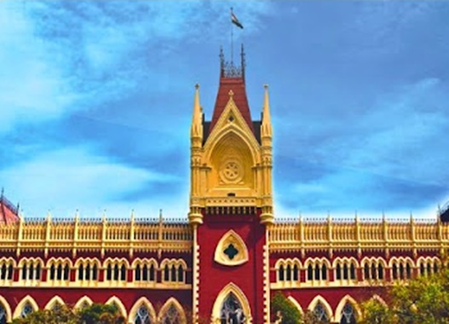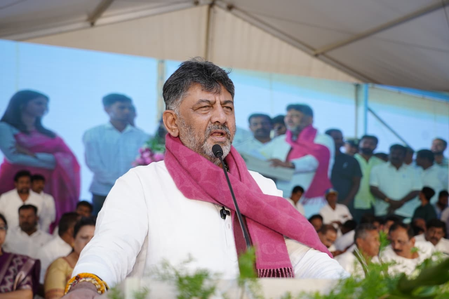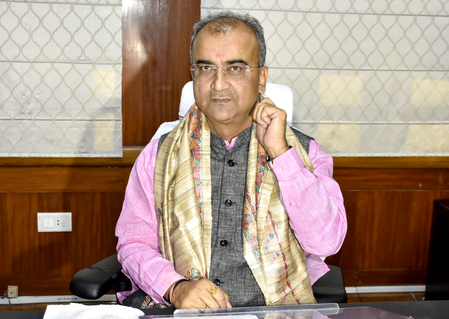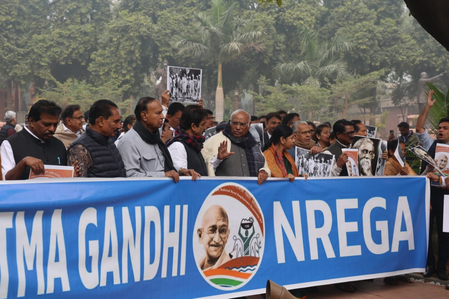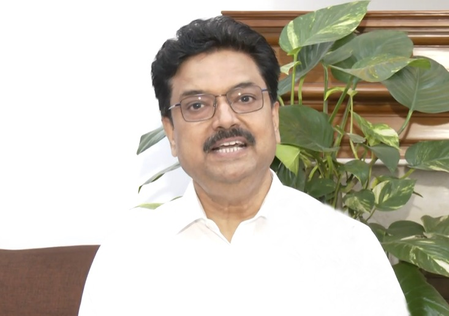
New Delhi, June 3 (IANS) Delhi University Vice-Chancellor Yogesh Singh on Tuesday said that the university is introducing a fourth year in undergraduate programmes. He also elaborated on the infrastructural development underway, revealing that projects worth around Rs 2,000 crore are currently in progress, as he expressed his aspiration to see the institution ranked among the top 100 universities globally within the next decade.
Yogesh Singh was appointed as the Vice-Chancellor of Delhi University on September 22, 2021, becoming the 23rd VC, succeeding Yogesh Tyagi.
In an exclusive interview with IANS, Yogesh Singh discussed a range of topics including the visit of Leader of the Opposition Rahul Gandhi to the DU campus, the new academic courses being introduced, and the infrastructural vision for the university.
Excerpts from the interview:
IANS: The fourth year of undergraduate studies is being introduced at DU. How are you preparing for its implementation?
Yogesh Singh: For the first time, a fourth year is being introduced in undergraduate programs at DU as recommended by the National Education Policy (NEP). We’ve been preparing for this for the past three years. This hasn’t happened suddenly. We’ve offered various options to students under this new structure. Students can choose their tracks based on their interests—whether they wish to pursue a research project or follow a particular specialisation. The focus is on fostering innovation and creativity, key components of the NEP. With the introduction of the fourth year, increased infrastructural support will naturally be needed, and we have already asked colleges to prepare accordingly. I believe there won’t be major issues, and if challenges arise, we’ll resolve them. The focus on research and innovation demands an enabling ecosystem. Our colleges are among the most prestigious in the country – 10 to 12 DU colleges are regularly ranked among the top 20 nationwide. Many of our faculty members are top researchers with well-established laboratories. They will play a critical role in advancing this initiative. For now, we are observing the admissions process. When something new is introduced, there are often uncertainties and apprehensions. But with careful planning, we will ensure smooth implementation. If any student faces difficulties, we will support them collectively.
IANS: How strong is DU’s current infrastructure, and what are your future plans?
Yogesh Singh: A tremendous amount of work is being done on infrastructure at Delhi University. I would like to thank the Government of India and Prime Minister Narendra Modi. You’ll be glad to know that projects worth nearly Rs 2,000 crore are underway to strengthen the university’s infrastructure. Over 100 years have passed since DU’s establishment, and naturally, much of the infrastructure has become outdated. To meet the demands of the 21st century, we need new and modern facilities – and the government is supporting us wholeheartedly in this. We are working simultaneously on developing the West and East Campuses. Additionally, two new colleges are being set up — Veer Savarkar in Najafgarh and another in Fatehpur Beri. These colleges will be operational soon. I’m confident that within the next one or two years, DU’s infrastructure will undergo a major transformation.
IANS: When will Veer Savarkar College be operational?
Yogesh Singh: The construction of Veer Savarkar College has already begun. I am confident that it will be fully functional by next year. In fact, it might even be ready within the next two or three months, but we are targeting next year for its official opening.
IANS: Rahul Gandhi visited DU without prior permission. Was any action taken?
Yogesh Singh: It’s not about taking action, but the practice of visiting without informing the administration is not appropriate. Rahul Gandhi is the Leader of the Opposition and a senior national leader. It would be better if such visits were coordinated with the university administration. This way, we can make proper arrangements. He has done this before as well – visited without notice. I believe such practices should be avoided in the future.
IANS: If this happens again with any leader, will action be taken?
Yogesh Singh: I’d like to convey through you that there is a proper procedure for visiting university premises. Leaders and dignitaries should inform and take permission before visiting. Following the protocol is important to avoid miscommunication and confusion. Otherwise, it sends the wrong message.
IANS: The principal of Laxmibai College applied cow dung in a classroom, claiming it would help reduce heat. In response, DUSU President Ronak Khatri applied cow dung in the principal’s office. Was this behaviour appropriate?
Yogesh Singh: The application of cow dung by the DUSU President in the principal’s room is not appropriate behaviour. Civilised and constructive ways of protest exist and should be used. We are living in 21st-century India, where our focus is on progress and development. Protests reminiscent of colonial times are no longer relevant. The Principal may have believed that applying cow dung would help cool the classroom—this was her personal experiment. She should have conducted it at her home or in her personal space before involving student areas. Similarly, Ronak Khatri should have refrained from retaliating in such a manner. This act was inappropriate and should not be repeated.
IANS: Will any disciplinary action be taken?
Yogesh Singh: I am not saying action must be taken, but such incidents should be avoided in the future. As DUSU President, he should focus on constructive leadership. When you do good work, you gain blessings and support automatically.
IANS: Operation Sindoor showcased the Indian Army’s courage. Will it be included in DU’s curriculum?
Yogesh Singh: It’s too early to make a definitive statement, but Operation Sindoor represents national pride, love for the country, the bravery of our armed forces, and the wisdom of our leadership. It also demonstrates how our government and PM Modi respond in times of crisis. These things deserve a place in the curriculum. Universities must focus not only on academics – like algorithms and research – but also on shaping patriotic citizens. Operation Sindoor made every Indian proud. National security and patriotism should be central themes in higher education.
IANS: What is being done to bring Operation Sindoor and the valour of the armed forces closer to students?
Yogesh Singh: Our colleges are actively organising debates, discussions, and awareness programmes centred on Operation Sindoor. These events help students understand how such military operations are planned and executed, and the courage involved. The soldiers are our own students—graduates of our universities—fighting for our safety. Every section of society has a role: the government, armed forces, and educational institutions. I would also like to acknowledge and congratulate the Prime Minister for his leadership during this operation.
IANS: DU created a social media handle related to Operation Sindoor. What was the purpose?
Yogesh Singh: After Operation Sindoor, there was a surge of patriotic sentiment across the country. We felt the university should contribute meaningfully. That’s why we launched a social media handle called “Ye Desh Hai Mera.” Its purpose is to provide accurate information and perspectives to the youth. It explores the intellectual, psychological, and research aspects of such national events. In times when narratives are being manipulated, it’s important to offer clarity. We launched this handle on platform X to engage students in constructive national dialogue. Prime Minister Modi has taken a pledge toward “Viksit Bharat@2047,” and safeguarding the country is a responsibility of the current generation. As India grows, so do the challenges. That’s why national love must be at the heart of every citizen’s values.
IANS: Delhi’s Chief Minister Rekha Gupta is a DU alumnus. What does that mean for the university?
Yogesh Singh: Delhi University is 100 years old and has contributed immensely to the lives of countless students. We are proud that the current Chief Minister is our alumna. It’s a moment of great pride. We are equally proud that the Prime Minister also studied here.
IANS: Have any new academic programmes been introduced to enhance students’ futures?
Yogesh Singh: DU is launching programmes aligned with the country’s current needs. For instance, we are planning to introduce a Bachelor of Science (BSc) in Electronic Science. Fields such as Artificial Intelligence, Data Science, and the Internet of Things (IoT) are crucial today, and our curriculum is evolving accordingly. We’ve also encouraged the Hindi and English departments to start MA programmes in Journalism. The English department will launch it this year, and the Hindi department will follow next year. Accurate and responsible dissemination of information is vital in a democracy, and these courses will contribute to that goal.
IANS: Where do you envision DU in the next ten years?
Yogesh Singh: There are various global parameters to assess academic performance. One of the most significant is the QS World University Rankings. A few years ago, DU’s rank was around 500. Today, it stands at 328 globally, and several departments rank within the top 100. Our goal is to bring DU into the top 100 globally within the next ten years. We aim to provide world-class education to our students and continually improve our academic standards.
IANS: There are frequent allegations that DU is being influenced by a particular ideology, specifically the RSS. What’s your take on this?
Yogesh Singh: Honestly, I don’t understand the accusation. Our goal is to nurture students who love and care for the country. Every university should aim to develop responsible and patriotic citizens. During times of national crisis, every citizen must contribute. Promoting love for the country should not be politicised. If that’s seen as a particular ideology, I have nothing further to add. But yes, we are committed to national development and responsible education.
IANS: Is it true that people of a particular ideology are being recruited at DU?
Yogesh Singh: I completely disagree with that. We follow a transparent and multi-stage recruitment process that includes screening, interviews, and evaluation of communication, writing, and soft skills. Experts from across the country are involved. Those making such allegations either lack understanding of the system or don’t have the facts.
IANS: Do you think some people are trying to turn DU into JNU?
Yogesh Singh: JNU is a different university with its own identity and culture. We are DU, and we have our own unique character. There is no comparison, and there’s no intention of becoming like JNU.
–IANS
jk/vd

